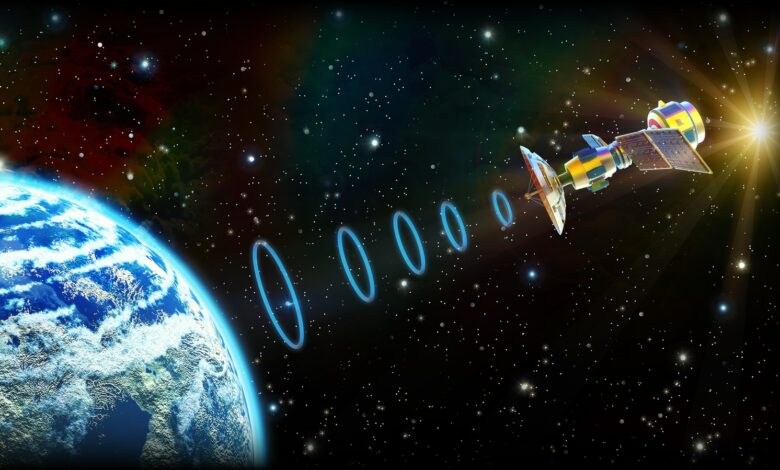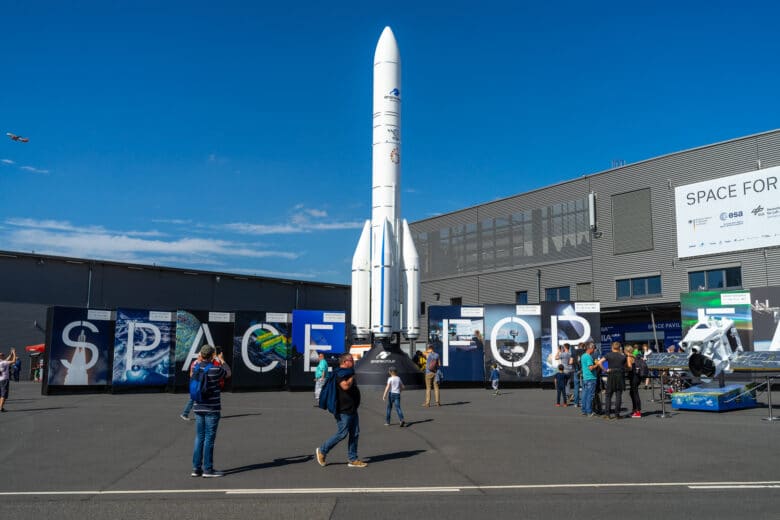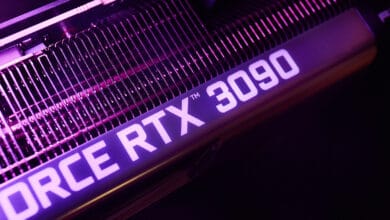
What Elon can do, Jeff has been able to do for a long time? The competition between the two big tech stars Elon Musk and Jeff Bezos is apparently going into the next round. Now Amazon wants to do the same as Starlink and also set up a satellite Internet. For its so-called “Project Kuiper,” the online shipping giant is planning a total of 83 rocket launches over the next five years.
In the next five years 3300 satellites
The goal sounds quite ambitious. Amazon apparently wants to get up and running quickly with its in-house satellite Internet. At least, if the company has its way, a total of 3300 satellites should find their way into orbit around the Earth within the next five years. This was announced by the company on Tuesday. To make this a reality, Amazon has booked 83 rocket launches. In addition to the European Ariane 6, rockets of the Vulcan Centaur and New Glenn models are to be used. While Amazon will probably only be able to recoup its proud investment in the form of profitable Internet contracts once “Project Kuiper” is completed, the aerospace companies are already profiting.

So Arianespace, manufacturer of the Ariane 6, has announced that this is the largest contract in the company’s entire history. Amazon CEO Jeff Bezos would certainly have preferred to use only the company’s own Blue Origin rockets. But given the tight schedule, this would certainly not have been possible. Surprisingly, neither Ariane 6, Vulcan Centaur nor New Glenn have ever lifted off from Earth. So Amazon is taking a certain risk here, but there is no alternative in view of the great race in orbit. After all, more and more satellite Internet companies are establishing themselves in orbit with their own missiles.
A true all-rounder
Amazon announced its satellite Internet project three years ago. Now it is finally entering the hot phase. Although Amazon’s own satellites are not even in orbit yet, the company is already well aware of how they are to be used. The goal, according to the company, is to
“improve worldwide access to global broadband Internet”
In the end, the fast Internet is not only to be used in simple private households. Also public institutions such as:
“schools, hospitals, businesses, government agencies, disaster relief organizations, mobile operators and other organizations located in places without reliable Internet connectivity.”
are to receive a fast and reliable Internet connection. At the same time, the group makes it clear that they are not only focused on speed. On top of that, the Internet should be reliable and especially resilient. Anyone who thinks back to the peak phase of the pandemic knows how important resilience is. Here, companies such as Netflix had to lower their streaming quality in part so that the Internet would not be overloaded in the face of the huge rush.
A shot in the dark?
The whole project does seem a bit nebulous then. After all, it’s still questionable so far whether the sheer volume of satellites will even be needed. Here, one can get the impression that Amazon simply wants to secure as much space in orbit as quickly as possible. In view of the fast pace of the others, this is quite understandable. True to the motto “having is better than needing,” industry leader SpaceX is also continuing to upgrade. Tech icon Elon Musk’s space company is already supplying many countries with Internet with its more than 2,000 Internet satellites.
If Amazon is able to quickly realize its plan, its satellite fleet will likely dwarf Musk’s. Incidentally, Project Kuiper is likely to become the first real competition for SpaceX. After all, other providers like OneWeb are relying on a very different customer base. The British satellite Internet operator has a fleet that includes 700 satellites, but focuses exclusively on serving businesses and public institutions.
The cost is unknown
Jeff Bezos, CEO of Amazon, is not known for bragging about many numbers. Accordingly, it is so far unknown how much money the corporation is paying to order the rocket launches. What is certain is that the distribution among three different companies for rockets was not only chosen for reasons of scarce time. This is also intended to minimize the risk of false starts in advance. Since not a single one of the three rockets has ever taken off, this is quite understandable. But so that shareholders don’t start sweating, Amazon has confirmed at the same time that it wants all three rockets to be put through their paces itself.
Jam in orbit
As important as fast and stable Internet may be to all of us, the procedure currently taking place in Earth’s orbit is frightening. Experts now have grave fears that the already ever-growing pile of space debris could grow even larger. On Earth, we probably don’t have to worry about falling debris. The sun ensures that they burn up as quickly as possible. However, satellites do have consequences for science. After all, they prevent a clear view of space. But not only scientists, but also us average citizens are denied a view of the stars as a result.
Space travel itself must also exercise caution in view of the many missiles. After all, they do not only threaten flights into space. On top of that, collisions with space stations such as the ISS can pose a risk to astronauts and the expensive technology. What already began with the deployment of Starlink’s Internet satellites is unlikely to get any better with Amazon’s more than 3,000 additional satellites. Other companies have also announced the launch of their own constellations consisting of many satellites. In the future, we will probably have to say goodbye to the typical sky picture.




No replies yet
Neue Antworten laden...
Neues Mitglied
Beteilige dich an der Diskussion in der Basic Tutorials Community →